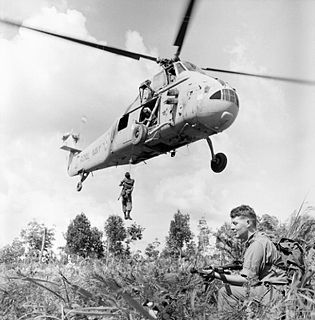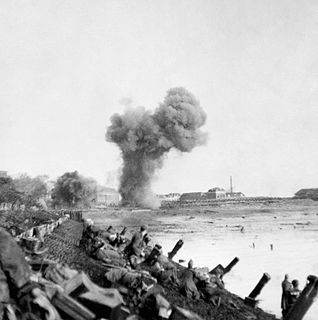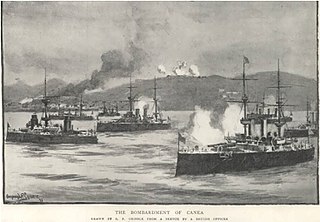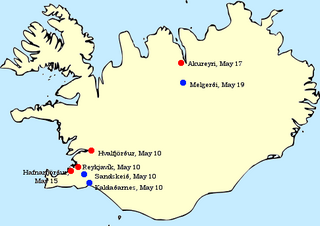 W
WThe 63rd Division was a United Kingdom infantry division of the First World War. It was originally formed as the Royal Naval Division at the outbreak of the war, from Royal Navy and Royal Marine reservists and volunteers, who were not needed for service at sea. The division fought at Antwerp in 1914 and at Gallipoli in 1915. In 1916, following many losses among the original naval volunteers, the division was transferred to the British Army as the 63rd Division, re-using the number from the disbanded second-line 63rd Division Territorial Force. As an Army formation, it fought on the Western Front for the remainder of the war.
 W
WThe Invasion of the Falkland Islands, code-named Operation Rosario, was a military operation launched by Argentine forces on 2 April 1982, to capture the Falkland Islands, and served as a catalyst for the subsequent Falklands War. The Argentines mounted amphibious landings and the invasion ended with the surrender of Falkland Government House.
 W
WThe Aden Emergency, also known as the Radfan Uprising, was an armed insurgency by NLF and FLOSY during the Cold War against the Federation of South Arabia, a protectorate of the British Empire, which now forms part of Yemen.
 W
WThe Battle of Bunker Hill was fought on June 17, 1775, during the Siege of Boston in the early stages of the American Revolutionary War. The battle is named after Bunker Hill in Charlestown, Massachusetts, which was peripherally involved in the battle. It was the original objective of both the colonial and British troops, though the majority of combat took place on the adjacent hill which later became known as Breed's Hill.
 W
WThe Boxer Rebellion (拳亂), Boxer Uprising, or Yihetuan Movement (義和團運動) was an anti-imperialist, anti-foreign, and anti-Christian uprising in China between 1899 and 1901, towards the end of the Qing dynasty.
 W
WThe Brunei revolt was a December 1962 insurrection in the British protectorate of Brunei by opponents of its monarchy and its proposed inclusion in the Federation of Malaysia. The insurgents were members of the TNKU, a militia supplied by Indonesia and linked to the leftwing Brunei People's Party (BPP), which favoured a North Borneo Federation. The TNKU began co-ordinated attacks on the oil town of Seria, on police stations, and on government facilities around the protectorate. The revolt began to break down within hours, having failed to achieve key objectives such as the capture of Brunei town and Sultan Omar Ali Saifuddien III. The revolt influenced the Sultan's 1963 decision not to join Malaysia. It is seen as one of the first stages of the Indonesia–Malaysia confrontation.
 W
WThe First Opium War, also known as the Opium War or the Anglo-Chinese War, was a series of military engagements fought between Britain and the Qing dynasty of China. The immediate issue was Chinese official seizure of opium stocks at Canton to stop the banned opium trade, and threatening the death penalty for future offenders. The British government insisted on the principles of free trade, equal diplomatic recognition among nations, and backed the merchants' demands. The British navy defeated the Chinese using technologically superior ships and weapons, and the British then imposed a treaty that granted territory to Britain and opened trade with China.
 W
WThe Gallipoli campaign, also known as the Dardanelles campaign, the Battle of Gallipoli or the Battle of Çanakkale, was a military campaign in the First World War that took place on the Gallipoli peninsula, from 17 February 1915 to 9 January 1916. The Entente powers, Britain, France and Russia, sought to weaken the Ottoman Empire, one of the Central Powers, by taking control of the straits that provided a supply route to the Russian Empire. The Allied attack on Ottoman forts at the entrance of the Dardanelles in February 1915 failed and was followed by an amphibious landing on the Gallipoli peninsula in April 1915 to capture the Ottoman capital of Constantinople (Istanbul).
 W
WThe Great Siege of Gibraltar was an unsuccessful attempt by Spain and France to capture Gibraltar from the British during the War of the American Revolution. The American war had ended with the British defeat at Yorktown in October 1781, but the Bourbon defeat in their great final assault on Gibraltar would not come until September 1782. The siege was suspended in February 1783 at the beginning of peace talks with the British.
 W
WThe 2011 Helmand Province killing was the manslaughter of a wounded Taliban insurgent by Alexander Blackman, which occurred on 15 September 2011. Three Royal Marines, known during their trial as Marines A, B, and C, were anonymously tried by Court Martial. On 8 November 2013, Marines B and C were acquitted, but Blackman was initially found guilty of murder of the Afghan insurgent, in contravention of section 42 of the Armed Forces Act 2006. This made him the first British soldier to be convicted of a battlefield murder whilst serving abroad since the Second World War.
 W
WThe Honourable Artillery Company (HAC) was incorporated by royal charter in 1537 by King Henry VIII and is considered the second-oldest military corps in the world. Today, it is a registered charity whose purpose is to attend to the "better defence of the realm". This purpose is primarily achieved by the support of the HAC Regiment and a detachment of City of London Special Constabulary. The word "artillery" in "Honourable Artillery Company" does not have the current meaning that is generally associated with it, but dates from a time when in the English language that word meant any projectile, including for example arrows shot from a bow. The equivalent form of words in modern English would be either "Honourable Infantry Company" or "Honourable Military Company".
 W
WThe Indonesia–Malaysia confrontation or Borneo confrontation was a violent conflict from 1963–66 that stemmed from Indonesia's opposition to the creation of Malaysia. The creation of Malaysia was the amalgamation of the Federation of Malaya, Singapore and the crown colony/British protectorates of North Borneo and Sarawak in September 1963. Vital precursors to the conflict included Indonesia's policy of confrontation against Netherlands New Guinea from March–August 1962 and the Brunei Revolt in December 1962.
 W
WOperation Infatuate was the code name given to an Anglo-Canadian operation during the Second World War to open the port of Antwerp to shipping and relieve logistical constraints. The operation was part of the wider Battle of the Scheldt and involved two assault landings from the sea by the 4th Special Service Brigade and the 52nd (Lowland) Division. At the same time the 2nd Canadian Infantry Division would force a crossing of the Walcheren causeway.
 W
WThe International Squadron was a naval squadron formed in early 1897 by a number of Great Powers just before the outbreak of the Greco-Turkish War of 1897 to intervene in a native Greek rebellion on Crete against rule by the Ottoman Empire. Warships from Austria-Hungary, France, the German Empire, Italy, the Russian Empire, and the United Kingdom made up the squadron, which operated in Cretan waters from February 1897 to December 1898.
 W
WThe invasion of Iceland by the Royal Navy and Royal Marines occurred on 10 May 1940, during World War II. The invasion was performed because the British government feared that Iceland would be used by the Germans, who had recently overrun Denmark, which was in personal union with Iceland and which had previously been largely responsible for Iceland's foreign policy. The Government of Iceland issued a protest, charging that its neutrality had been "flagrantly violated" and "its independence infringed".
 W
WThe Malayan Emergency was a guerrilla war fought in the Federation of Malaya from 1948 until 1960. The conflict was between Commonwealth armed forces and pro-independence fighters of the Malayan National Liberation Army (MNLA), the military wing of the Malayan Communist Party (MCP). The war was fought over attempts by communist forces to gain independence for Malaya from the British Empire and to establish a socialist economy. The fighting spanned both the colonial period and the creation of an independent Malaya (1957). Although it was referred to as "The Emergency" by colonial authorities, the MNLA referred to it as the "Anti-British National Liberation War". The conflict was called an "Emergency" by the British for insurance purposes, as London-based insurers would not have paid out in instances of civil wars.
 W
WThe North Russia intervention, also known as the Northern Russian expedition, the Archangel campaign, and the Murman deployment, was part of the Allied intervention in the Russian Civil War after the October Revolution. The intervention brought about the involvement of foreign troops in the Russian Civil War on the side of the White movement. The movement was ultimately defeated, while the Allied forces withdrew from Northern Russia after fighting a number of defensive actions against the Bolsheviks, such as the Battle of Bolshie Ozerki. The campaign lasted from March 1918, during the final months of World War I, to October 1919.
 W
WThe Occupation of Iceland during World War II began with a British invasion intent on occupying and denying Iceland to Germany. The military operation codenamed Operation Fork was conducted by the Royal Navy and Royal Marines. In time, the British forces were replaced by Canadian and later American forces, despite the fact that the United States was not yet in the war.
 W
WClaret was the code name given to operations conducted from about July 1964 until July 1966 from East Malaysia across the border in Indonesian Kalimantan during the Indonesia–Malaysia confrontation. They were instigated by the Director of Borneo Operations (DOBOPS) Major General Walter Walker with the agreement of the British and Malaysian governments. Their purpose was to seize the initiative and put the Indonesians on the defensive instead of allowing Indonesian forces to be safely based in Kalimantan and attack when and where they chose. However, it was important not to cause the Indonesians to lose face and possibly escalate the conflict, or to enable Indonesia to present evidence of 'imperialist aggression', so Claret operations were highly classified and never publicised, although it seems that some British journalists were aware of what transpired. British casualties on Claret operations were publicly reported as being in East Malaysia.
 W
WThe Zeebrugge Raid on 23 April 1918, was an attempt by the Royal Navy to block the Belgian port of Bruges-Zeebrugge. The British intended to sink obsolete ships in the canal entrance, to prevent German vessels from leaving port. The port was used by the Imperial German Navy as a base for U-boats and light shipping, which were a threat to Allied control of the English Channel and southern North Sea. Several attempts to close the Flanders ports by bombardment failed and Operation Hush, a 1917 plan to advance up the coast, proved abortive. As ship sinkings by U-boats increased, finding a way to close the ports became urgent and the Admiralty became more willing to consider a raid.
 W
WThe Selborne-Fisher scheme, or Selborne scheme refers to an effort by John Fisher, 1st Baron Fisher, Second Sea Lord, approved by William Palmer, 2nd Earl of Selborne, First Lord of the Admiralty, in 1903 to combine the military and engineering branches of the Royal Navy. The main goal was to return control over the movement of a ship to the military officer.
 W
WThe Siege of Antwerp was an engagement between the German and the Belgian, British and French armies around the fortified city of Antwerp during World War I. German troops besieged a garrison of Belgian fortress troops, the Belgian field army and the British Royal Naval Division in the Antwerp area, after the German invasion of Belgium in August 1914. The city, which was ringed by forts known as the National Redoubt, was besieged to the south and east by German forces. The Belgian forces in Antwerp conducted three sorties in late September and early October, which interrupted German plans to send troops to France, where reinforcements were needed to counter the French armies and the British Expeditionary Force (BEF).
 W
WThe invasion of South Georgia, also known as the Battle of Grytviken or Operation Georgias, took place on 3 April 1982, when Argentine Navy forces seized control of the east coast of South Georgia after overpowering a small group of Royal Marines at Grytviken.
 W
WThe War of the Spanish Succession (1701–1714) was an early 18th century European war, triggered by the death in November 1700 of the childless Charles II of Spain. A key outcome was establishing the principle that dynastic rights were secondary to maintaining the balance of power between different countries. Related conflicts include the 1700-1721 Great Northern War, Rákóczi's War of Independence in Hungary, the Camisard revolt in southern France, Queen Anne's War in North America and minor struggles in Colonial India.
 W
WThe Skirmish at Top Malo House took place on 31 May 1982 during the Falklands War, between 1st Assault Section Argentine Special Forces from 602 Commando Company and a patrol formed from staff and trainees of the British Mountain and Arctic Warfare Cadre, a training detachment of the Royal Marines who were under the Control of 3 Commando Brigade for Operation Corporate.